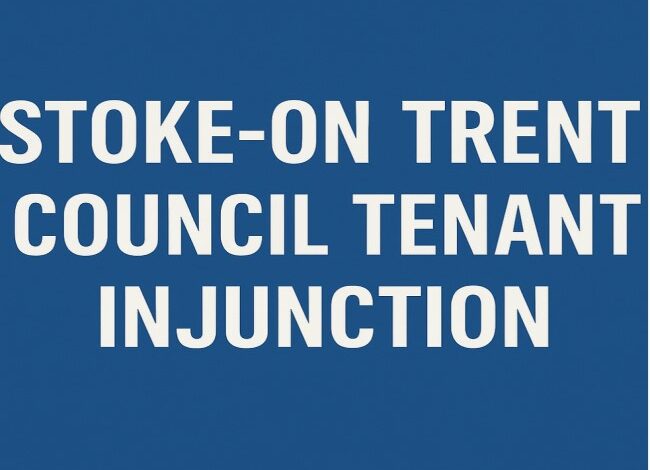Stoke-on-Trent Council Tenant Injunction: A Bold Move to Tackle Anti-Social Behaviour

Introduction: Stoke-on-Trent Council Tenant Injunction Explained
Stoke-on-Trent City Council has taken decisive action to maintain order and safety within its housing communities. The latest case involving a civil injunction against a council tenant highlights the city’s firm stance against anti-social behaviour (ASB). The term “Stoke-on-Trent council tenant injunction” has since captured public attention, symbolising not only the growing concern over community conduct but also the council’s proactive enforcement strategy.
This article explores the background, legal implications, community impact, and the broader message behind the injunction issued in Stoke-on-Trent — offering a detailed understanding of how councils are tackling unruly behaviour in social housing environments.
What Is a Council Tenant Injunction?
The Legal Framework Behind Injunctions
A tenant injunction is a legal order issued by a court at the request of a local authority. It aims to restrict or prohibit individuals from engaging in specific types of behaviour that are disruptive, abusive, or threatening.
What Can an Injunction Prevent?
-
Verbal or physical abuse towards neighbours
-
Harassment or intimidation
-
Vandalism or property damage
-
Loud or disruptive noise at inappropriate hours
-
Neglecting responsibilities such as pet control or waste management
Injunctions can come with conditions and, if breached, may lead to arrest or further legal consequences, including eviction.
Stoke-on-Trent Council Tenant Injunction: A Real Case
The Incident in Fenton
In March 2025, Stoke-on-Trent City Council secured a civil injunction against Shamaine Proctor, a tenant living on Philip Street, Fenton. The action was taken following persistent reports of:
-
Verbal abuse and threats directed at neighbours
-
Aggressive behaviour towards council staff and contractors
-
Failure to control a pet dog, causing concern in the neighbourhood
The council’s Anti-Social Behaviour (ASB) team collected substantial evidence over time, documenting a pattern of disruptive and unsafe behaviour.
Court’s Verdict and Conditions
A local court granted a Civil Injunction Order, imposing strict prohibitions, including:
-
No further abuse or harassment of neighbours
-
No verbal or physical aggression towards council staff
-
Proper management of any dog in her care
Financial Penalty
The tenant was also ordered to pay £1,017 in legal costs, reinforcing the seriousness of the matter.
Community Impact and Council’s Stance
Councillor Majid Khan’s Statement
Stoke-on-Trent’s Cabinet Member for Community Resilience, Councillor Majid Khan, emphasised that the council will not tolerate anti-social behaviour of any kind. He noted that swift legal actions like these send a strong message to offenders, reinforcing the council’s commitment to creating safe and respectful communities.
Restoring Peace in Neighbourhoods
Residents of Philip Street welcomed the move, as it brought a sense of relief and showed that their complaints had been taken seriously. Council officials believe such interventions deter future incidents and encourage responsible behaviour.
The Process: How Do Tenant Injunctions Work?
Investigation Phase
The process begins when multiple complaints or serious issues are reported by neighbours or council employees. The council investigates thoroughly, sometimes collaborating with local police and support services.
Gathering Evidence
Evidence may include:
-
Witness statements
-
Audio/video recordings
-
Complaint logs
-
Council staff reports
This evidence is crucial in presenting a compelling case in court.
Legal Proceedings
Once evidence is compiled, the case is taken to court, where a judge evaluates the material and determines whether the injunction should be granted.
Understanding the Tenant’s Responsibilities
What Council Tenants Must Know
Being a tenant of council housing comes with specific rights — but also responsibilities. These include:
-
Respecting neighbours and the community
-
Adhering to tenancy agreements
-
Ensuring pets do not cause harm or nuisance
-
Complying with noise regulations
-
Allowing council staff safe and respectful access for repairs
Failure to comply can lead to serious consequences, such as injunctions, fines, or even eviction.
Broader Message to the Public
No Room for Anti-Social Behaviour
The Stoke-on-Trent council tenant injunction is more than just a legal action against one individual — it represents the council’s broader campaign to uphold standards across all public housing sectors. The message is clear: disruptive and harmful behaviour will not go unchecked.
Encouraging Responsible Tenancy
This action serves as a reminder to all tenants that living in a shared community requires mutual respect. Tenants who repeatedly breach acceptable norms not only face legal consequences but also risk their housing security.
How Residents Can Report Anti-Social Behaviour
Taking Action as a Community Member
Residents play a key role in maintaining peaceful communities. If someone is experiencing or witnessing anti-social behaviour, they are encouraged to report it. Common issues that should be reported include:
-
Persistent noise nuisance
-
Verbal abuse or threats
-
Vandalism or property damage
-
Uncontrolled pets
-
Drug-related activity
Reports can typically be made via phone or in person to the council’s ASB team.
Conclusion: Why This Case Matters
The Stoke-on-Trent council tenant injunction marks a firm and necessary intervention. It shows that the council takes the safety and well-being of its communities seriously, and it has the legal backing to act when residents overstep the line.
This specific case involving Shamaine Proctor stands as a public example that persistent anti-social behaviour is not only unacceptable but will lead to tangible legal consequences. With a commitment to protecting communities and promoting respectful tenancy, Stoke-on-Trent City Council is setting a precedent that many other local authorities are likely to follow.



